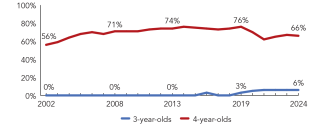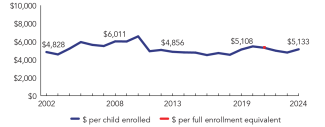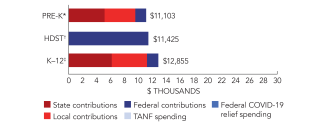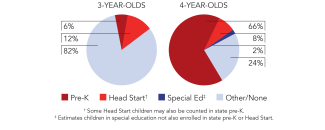
State of Preschool
Oklahoma
Access Rankings
Resource Rankings
Total Benchmarks Met
Overview

During the 2023-2024 school year, Oklahoma preschool enrolled 38,457 children, a decrease of 525 from the prior year. State spending totaled $197,385,755, up $11,288,674 (6%), adjusted for inflation, since last year. State spending per child equaled $5,133 in 2023-2024, up $359 from 2022-2023, adjusted for inflation. Oklahoma met 9 of 10 quality standards benchmarks.
What's New

The Oklahoma State Department of Education (OSDE) has been actively working on several initiatives aimed at improving student outcomes in early childhood education. Two key projects that have been launched to enhance the quality of early learning and support educators are the Leading Early Childhood Achievement and Development (LEAD) Project and the Early Learning Inventory (ELI) assessment tool.
Through the LEAD project, school leaders and educators are trained in research-based early learning practices, including play-based learning. The initiative aims to ensure that teachers are better equipped to foster positive academic outcomes for young learners, with play-based learning being a central element.
The ELI assesses foundational skills such as alphabet knowledge and counting, along with key dispositions and abilities that support early learning. It covers 26 indicators across six domains, giving teachers a comprehensive view of students’ learning progress. The tool allows educators to adjust their instructional strategies to meet students’ individual needs.
The state is also developing structures to support Early MTSS (Multi-Tiered System of Support) for Pre-K to promote young children’s healthy development, reduce challenging behaviors, and increase learning opportunities. This framework is grounded in universal support, ensuring all children benefit from high-quality instruction in a positive environment.
During the 2023-2024 school year, the Dolly Parton’s Imagination Library of Oklahoma, a book gifting program, expanded to over 500 communities around the state, serving 78,000 children under the age of five. Getting books into the hands of families with young children is a critical piece of the literacy journey. The overwhelming success of this project is due in part to the investment of Preschool Development Grant Birth through Five (PDGB-5) funds.
Background
Oklahoma launched its Early Childhood Four-Year-Old Program in 1980, intending to serve all 4-year-olds in the state. In 1990, the program received statewide funding for 4-year-olds eligible for the federal Head Start program, but local areas could choose to serve additional 4-year-olds with local funds or tuition. In 1998, Oklahoma became the second state in the nation to provide free preschool for all 4-year-olds, with 100% of school districts providing the program. In addition, funding for 3-year-olds is provided by the Oklahoma Early Childhood Program (OECP) through a pass-through from the state to public school districts.
Oklahoma Early Childhood Four-Year-Old Program
Access
Resources
| Total state pre-K spending | $197,385,755 |
| Local match required? | No |
| State Head Start spending | $1,806,000 |
| State spending per child enrolled | $5,133 |
| All reported spending per child enrolled* | $11,103 |

*Pre-K programs may receive additional funds from federal or local sources that are not included in this figure. †Head Start per-child spending includes funding only for 3- and 4-year-olds. ‡K–12 expenditures include capital spending as well as current operating expenditures.
Oklahoma Quality Standards Checklist
| Policy | Requirement | Benchmark | Meets Benchmark? |
|---|---|---|---|
For more information about the benchmarks, see the Executive Summary and the Roadmap to State pages. | 9benchmarks met | ||
| Early Learning & Development Standards Benchmark | Comprehensive, aligned, supported, culturally sensitive | Comprehensive, aligned, supported, culturally sensitive | |
| Curriculum Supports Benchmark | Approval process & supports | Approval process & supports | |
| Teacher Degree Benchmark | BA | BA | |
| Teacher Specialized Training Benchmark | ECE | Specializing in pre-K | |
| Assistant Teacher Degree Benchmark | HSD | CDA or equivalent | |
| Staff Professional Development Benchmark | 15 hours/year; PD plans; Coaching | For teachers & assistants: At least 15 hours/year; individual PD plans; coaching | |
| Maximum Class Size Benchmark | 18 (3-year-olds); 20 (4-year-olds) | 20 or lower | |
| Staff to Child Ratio Benchmark | 1:9 (3-year-olds); 1:10 (4-year-olds) | 1:10 or better | |
| Screening & Referral Benchmark | Vision, hearing, immunizations | Vision, hearing & health screenings; & referral | |
| Continuous Quality Improvement System Benchmark | Structured classroom observations; Data used for program improvement | Structured classroom observations; data used for program improvement | |
